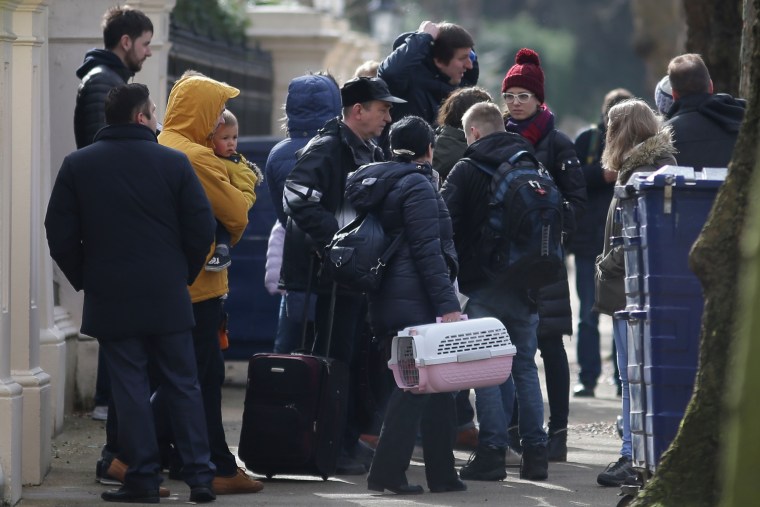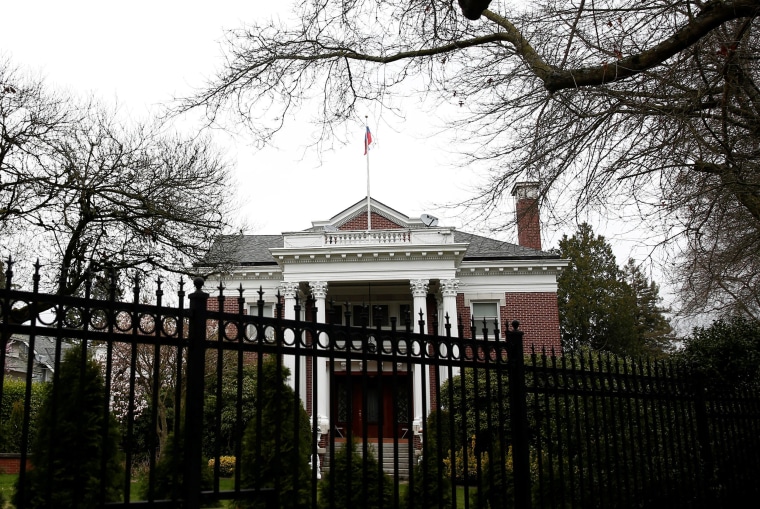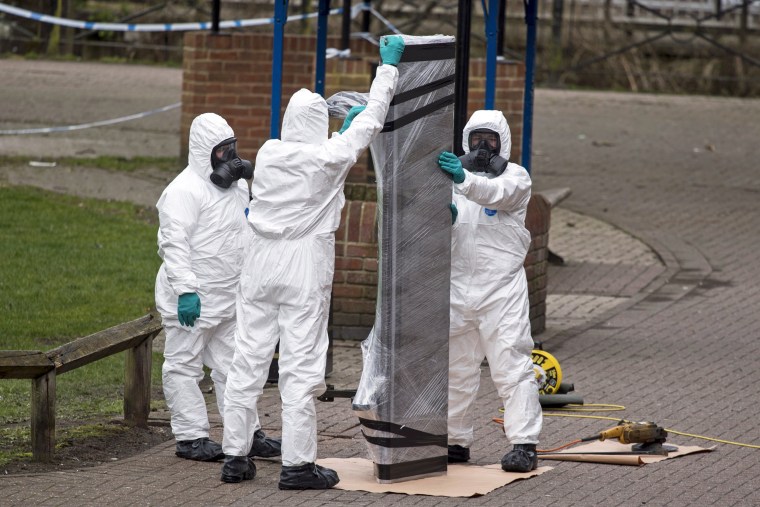The U.S. has expelled 60 Russian diplomats, and the Russians have now responded by expelling 60 U.S. diplomats.
In a statement Thursday, Russia's Foreign Ministry said that "based on the principle of reciprocity," the 60 Americans in Moscow and Yekaterinburg "were declared 'persona non grata' for activities incompatible with diplomatic status." The Americans have to leave the country before April 5, 2018.
"Persona non grata" is the same term the U.S. uses when it expels diplomats. National security types call the expulsions "PNGing," from the initials.
So how do the U.S. and the Russians decide which diplomats to kick out? And does it have any impact?
Experts consulted by NBC News say the Russian diplomats who were expelled from the U.S. were really spies, for the most part, and PNGing dozens of them is more than symbolic — it has an immediate, if short-term, effect on the ability of Russia to collect intelligence inside the U.S.
Earlier this month, Sergei Skripal and his daughter were poisoned by nerve gas in the southwestern English city of Salisbury. British authorities immediately suspected the pair had been poisoned by Russian agents trying to silence Skripal, a former Russian intelligence officer who had been a double agent.
Twenty-six countries expelled more than 150 Russian diplomats in response to the poisoning. According to current and former U.S. officials, the Russians had violated one of the unwritten rules of espionage — no assassinations, especially not on another country's soil.
One current official said there is a gentlemen's agreement — "honor among thieves" — in which there are lines spies should not cross. If a line is crossed, the offended party can expel as PNGs those diplomats it thinks may have some link to the violation.

In addition to murder, the official said offenses that have sparked past expulsions from Western nations include:
- Internal political meddling, like Russia's interference in the 2016 U.S. election;
- Preparations for the outbreak of war;
- Acts of sabotage;
- Stealing or trying to steal a nation's "continuity of government plans," i.e., how the top levels of government would react after a nuclear strike. FBI mole Robert Hanssen gave the U.S. plans to the Russians, and the U.S. expelled Russian diplomats after he was caught in 2001.
The phrase itself, PNG, comes from the 1961 Vienna Convention, an international treaty that defined rules for diplomatic relations. Article 9 of the treaty says that "without having to explain its decision," the host nation can notify the "sending State" that "any member of the diplomatic staff of the mission is persona non grata."
When the Russians summoned U.S. Ambassador Jon Huntsman to the Foreign Ministry, they were notifying the "sending State" that they planned to expel 60 Americans. When the Foreign Ministry announced publicly that the Americans had been chosen for expulsion for "activities incompatible with diplomatic status," they were calling them spies without giving details.
Once declared persona non grata,a diplomat must leave the country "within a reasonable period" or risk losing diplomatic immunity.

The U.S. expulsion of 60 diplomats in March was the second such purge in less than 18 months. The Obama administration had PNGed 35 diplomats in late 2016 in retaliation for Russian cyber meddling in the U.S. presidential election.
According to the current and former U.S. officials, in both cases the FBI and CIA had previously identified the operatives and gave the list to policy makers, who made the final decisions. Many of the Russians who fill diplomatic positions in the U.S. are actually operatives working for the country's various intelligence services.
On Tuesday, State Department spokesperson Heather Nauert said that the U.S. gave Russia the names of the PNGed individuals after an interagency process that included the "weigh-in" of many "U.S. government partners," like the FBI.
"We believe our country is safer by making these Russians go home," said Nauert. "We know that they were not here to do good, but rather, they could have done something potentially bad … I think, if you look at the actions that took place against the British citizen and his daughter, it's clear that, perhaps, our citizens were not safe."
This month's expulsion also included the shuttering of a consulate in Seattle. The Trump administration had shuttered the Russian consulate in San Francisco in 2017, and the Obama administration shut Russian recreation facilities in Maryland and New York in December 2016. Consulates and embassies can serve as hubs for human and electronic data collection, say the officials.
The most recent purge, said a current U.S. official, was meant to "put a dent in Russian spy operations" both by creating chaos in Russia's U.S. operations and limiting their geographic reach.
Officials say that by closing the diplomatic and recreation complexes, the administration has made it easier for the FBI to tail suspected agents in New York and Washington. The U.S. had also been concerned that the Seattle and San Francisco consulates, which are close to centers of the nation's cyber industry, had been used to gather info on U.S. technology.
The effect of the expulsions, however, will probably not be long-lived.
"This may put a temporary dent in their capability," said former acting CIA Director John McLaughlin, now an NBC News analyst, "but Russia is a national security state that puts great emphasis on espionage and deals with or brooks no public controversy about it. They will replace their losses, and we also have to factor in how many 'illegals' they have here, which I don't know."
Even without accounting for "illegals," meaning agents who are not under diplomatic cover, the expulsions actually leave a large complement of operatives behind. The generally accepted number of Russian spies operating undercover in U.S.-based diplomatic facilities and at the United Nations is 250, meaning more remain in the U.S. than were ejected.
Those who were ousted, meanwhile, will be rapidly replaced.
"They will try to replenish and they have a cushion to start with," said Dan Hoffman, a former CIA Russian expert and former CIA Moscow station chief.
McLaughlin thinks after a short-term loss in "skills and experience and on-the-ground street savvy," the Russians will be back up to speed in three to six months.
The current and former officials also say they don't expect the expulsions to deter Russian President Vladimir Putin's from aggressive actions. The price has already been factored into his calculations.
"He will gladly accept it," said one current U.S. official, "in return for what he got out of the election interference and the Skripal poisoning." A former official says Putin may have even invited the reprisals, as a way of proving he is the defender of "Fortress Russia" against the West.
And not everyone agrees with the strategy. McLaughlin calls the expulsions "a very Cold War thing to do," and thinks they are "too reflexive and symmetrical."
Richard Haas, the president of the Council on Foreign Relations, tweeted out his objections Monday, saying expulsions are "less than optimal" and "will likely lead to Moscow responding in kind," meaning expulsions of U.S. diplomats — an accurate prediction of what occurred Thursday.
Haas suggested instead an "asymmetrical response, i.e., targeted economic and travel sanctions, increased public diplomacy vs Putin, etc." Otherwise, he suggested the costs will fall mainly on the U.S. in the form of reduced capabilities in Moscow and elsewhere inside Russia.
Hoffman agrees the U.S. is likely to be hurt by ay tit-for-tat response, since Russia's authoritarian culture makes it far better able to restrict U.S. intelligence operations in Moscow. He noted that the Russians already make life miserable for U.S. diplomats suspected of being spies — even beating them up on the streets of Moscow.
But he said he believes the U.S. expulsions, despite the Russian response, are the best alternative, particularly if, as president, Trump really wants a summit with the Russian leader.
"It's the right message you want to deliver before a summit," said Hoffman, "that 'we are going to hold you responsible.' It had to be done. You can't have a summit without doing it."
